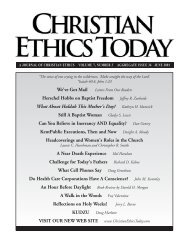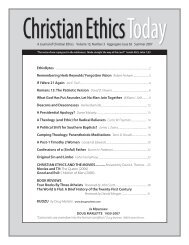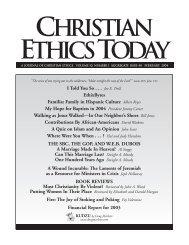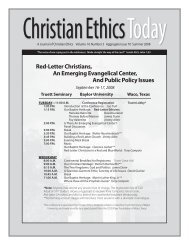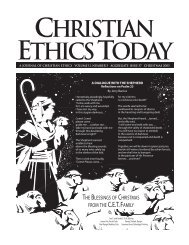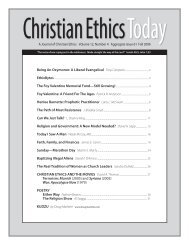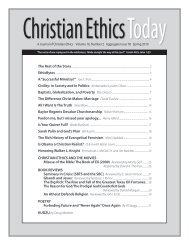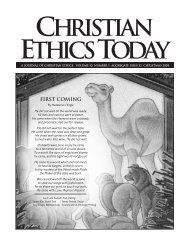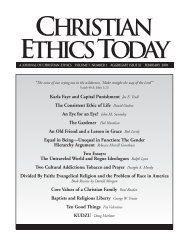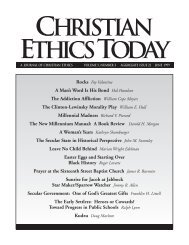Issue 033 PDF Version - Christian Ethics Today
Issue 033 PDF Version - Christian Ethics Today
Issue 033 PDF Version - Christian Ethics Today
You also want an ePaper? Increase the reach of your titles
YUMPU automatically turns print PDFs into web optimized ePapers that Google loves.
This doctrine of soul freedom has immediate, unfiltered<br />
application to Baptist battles. Harold Bloom, America’s best<br />
known literary critic sees “Mullins concept of ‘soul competence’<br />
destroying fundamentalism,” because it “sanctions endless<br />
interpretive possibilities, the weird metaphor of a ‘literal’<br />
or ‘inerrant’ reading totally vaporizes.” Even Karl Barth told<br />
Louie Newton, “How I thank God for Mullins. [He] gave the<br />
world a mighty phrase—the competency of the soul. One cannot<br />
improve on Mullins’ definitions of soul freedom: “The<br />
capacity to deal directly with God.” and “The sinner’s<br />
response to the gospel message [as] an act of moral freedom.”<br />
Religious Liberty<br />
Religious Liberty, the next circle out must follow soul freedom.<br />
It is based on the biblical view of persons. Created<br />
in the image of God, a human being is the crowning work of<br />
God’s creation (bio-centrists notwithstanding). To deny freedom<br />
of conscience to any person is to debase God’s creation.<br />
When anyone’s religious freedom is denied, everyone’s religious<br />
freedom is endangered.<br />
George W. Truett put the concept in Victorian rhetoric<br />
that sounds strange to the ear but rings true to the soul. In his<br />
famous 1920 speech on the steps of the United States Capitol<br />
he said, “The right to private judgment is the crown jewel of<br />
humanity, and for any person or institution to dare to come<br />
between the soul and God is blasphemous impertinence and a<br />
defamation of the crown rights of the Son of God.”<br />
The Universal Declaration of Human Rights adopted in<br />
1948 recognizes religious liberty as an entitlement of all<br />
human beings, a human right whatever their race or nation.<br />
We claim it as the basic human right, the primary human<br />
right, the ultimate human right. That is so because through<br />
the lenses of religious liberty we know ourselves, come to<br />
understand and value others and try to figure out the world.<br />
George Jellinek argued convincingly that “freedom of conscience<br />
may be the oldest Right of Man, at any rate it is the<br />
most basic Right of Man (pre-gender free language) because it<br />
comprises all ethically conditioned action and guarantees freedom<br />
from compulsion, especially from the power of the state.”<br />
Religious liberty then as the basic human right is universal in<br />
4 • APRIL 2001 • CHRISTIAN ETHICS TODAY<br />
its appeal and application.<br />
The late James Ralph Scales of Wake Forest University<br />
stressed the universal and inviolable nature of religious liberty<br />
as the basis for church-state separation. He wrote in 1976 that<br />
religious liberty is “as nearly absolute as any safeguarded by the<br />
constitutions or practiced as a natural right.”<br />
For Bloom, consequences lie far beyond Baptists or religion<br />
or even “political, socioeconomic and anthropological<br />
implications” if religious liberty is neglected. That liberty “was<br />
also the stance of John Milton and Roger Williams…if that<br />
vision abandons the United States forever, then more than our<br />
spiritual democracy will yet be threatened.”<br />
Robert Torbet also linked religious liberty directly with<br />
church-state separation. He saw “an emphasis upon the accessibility<br />
of God to all men [and women] and the free responsibility<br />
of each individual before God, hence a free church in a<br />
free state.”<br />
Separation of Church and State<br />
This last of our irreplaceable circles coming off a pebble in<br />
a pond or a shock-sending earthquake is in separation of<br />
church and state. It is an organic part of core Baptist belief, an<br />
appendage which if amputated would bleed dry the Baptist<br />
life blood.<br />
Only last Friday the Executive of an American Baptist<br />
State Convention told me about a layman who lamented,<br />
“Why we did not just quit worrying about Baptist doctrines<br />
and be <strong>Christian</strong>s?” She asked, “like which doctrine?” and he<br />
replied, “like the doctrine of church-state separation.”<br />
There are many possible explanations to this sort of misunderstanding<br />
of church-state separation. The doctrine has been<br />
so distorted, diminished and deprecated that it’s easy to see<br />
how one could arrive at that point. Yet, it’s not just a Baptist<br />
doctrine, separation of church and state is an indissoluble<br />
aspect of our take on the essence of <strong>Christian</strong> faith.<br />
True, separation of church and state does not define<br />
Baptist theology but it is a logical, inextricable inevitable<br />
corollary of religious liberty as we know it. It is the plug which<br />
if pulled out of our machine, the motor dies. We go no more.<br />
So when anyone says, “Oh, I’m all for religious liberty but



